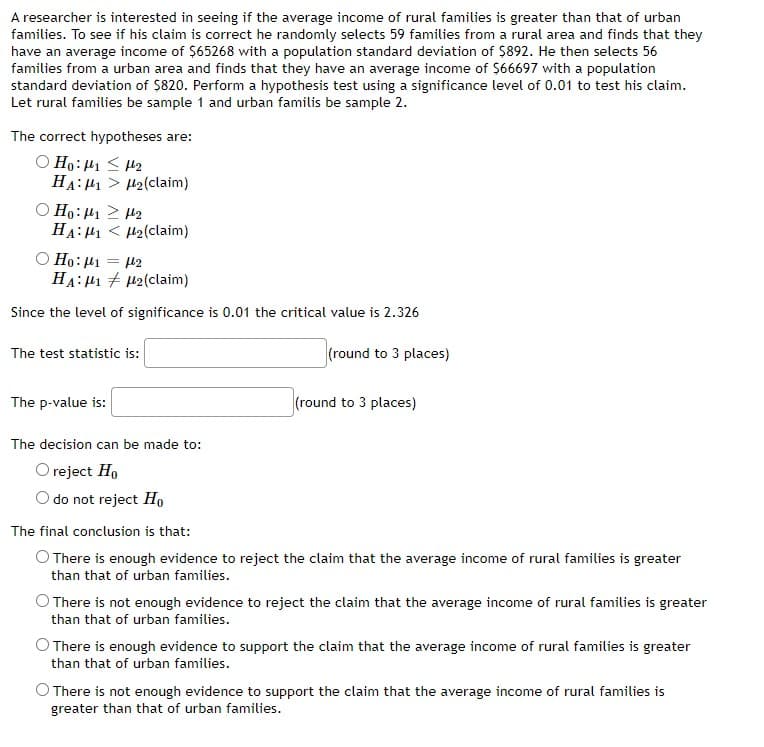A researcher is interested in seeing if the average income of rural families is greater than that of urban families. To see if his claim is correct he randomly selects 59 families from a rural area and finds that they have an average income of $65268 with a population standard deviation of $892. He then selects 56 families from a urban area and finds that they have an average income of $66697 with a population standard deviation of $820. Perform a hypothesis test using a significance level of 0.01 to test his claim. Let rural families be sample 1 and urban familis be sample 2. The correct hypotheses are: O Ho: ₁₂ HA: ₁₂(claim) Ο Η: με 2 με HA: ₁₂(claim) O Ho:μ1 = μ¹₂ HA: 12(claim) Since the level of significance is 0.01 the critical value is 2.326 (round to 3 places) The test statistic is: The p-value is: The decision can be made to: O reject Ho do not reject Ho (round to 3 places) The final conclusion is that: O There is enough evidence to reject the claim that the average income of rural families is greater than that of urban families. O There is not enough evidence to reject the claim that the average income of rural families is greater than that of urban families. O There is enough evidence to support the claim that the average income of rural families is greater than that of urban families. O There is not enough evidence to support the claim that the average income of rural families is greater than that of urban families.
A researcher is interested in seeing if the average income of rural families is greater than that of urban families. To see if his claim is correct he randomly selects 59 families from a rural area and finds that they have an average income of $65268 with a population standard deviation of $892. He then selects 56 families from a urban area and finds that they have an average income of $66697 with a population standard deviation of $820. Perform a hypothesis test using a significance level of 0.01 to test his claim. Let rural families be sample 1 and urban familis be sample 2. The correct hypotheses are: O Ho: ₁₂ HA: ₁₂(claim) Ο Η: με 2 με HA: ₁₂(claim) O Ho:μ1 = μ¹₂ HA: 12(claim) Since the level of significance is 0.01 the critical value is 2.326 (round to 3 places) The test statistic is: The p-value is: The decision can be made to: O reject Ho do not reject Ho (round to 3 places) The final conclusion is that: O There is enough evidence to reject the claim that the average income of rural families is greater than that of urban families. O There is not enough evidence to reject the claim that the average income of rural families is greater than that of urban families. O There is enough evidence to support the claim that the average income of rural families is greater than that of urban families. O There is not enough evidence to support the claim that the average income of rural families is greater than that of urban families.
Glencoe Algebra 1, Student Edition, 9780079039897, 0079039898, 2018
18th Edition
ISBN:9780079039897
Author:Carter
Publisher:Carter
Chapter10: Statistics
Section10.4: Distributions Of Data
Problem 19PFA
Related questions
Question

Transcribed Image Text:A researcher is interested in seeing if the average income of rural families is greater than that of urban
families. To see if his claim is correct he randomly selects 59 families from a rural area and finds that they
have an average income of $65268 with a population standard deviation of $892. He then selects 56
families from a urban area and finds that they have an average income of $66697 with a population
standard deviation of $820. Perform a hypothesis test using a significance level of 0.01 to test his claim.
Let rural families be sample 1 and urban familis be sample 2.
The correct hypotheses are:
Ο Ho: μι < με
HA:H1 H₂(claim)
Ο Η: με 2 με
HA: H1 H₂(claim)
Ho: 1
HA: 12(claim)
Since the level of significance is 0.01 the critical value is 2.326
= 142
The test statistic is:
The p-value is:
The decision can be made to:
O reject Ho
O do not reject Ho
(round to 3 places)
(round to 3 places)
The final conclusion is that:
O There is enough evidence to reject the claim that the average income of rural families is greater
than that of urban families.
O There is not enough evidence to reject the claim that the average income of rural families is greater
than that of urban families.
O There is enough evidence to support the claim that the average income of rural families is greater
than that of urban families.
O There is not enough evidence to support the claim that the average income of rural families is
greater than that of urban families.
Expert Solution
This question has been solved!
Explore an expertly crafted, step-by-step solution for a thorough understanding of key concepts.
Step by step
Solved in 3 steps

Recommended textbooks for you

Glencoe Algebra 1, Student Edition, 9780079039897…
Algebra
ISBN:
9780079039897
Author:
Carter
Publisher:
McGraw Hill

Glencoe Algebra 1, Student Edition, 9780079039897…
Algebra
ISBN:
9780079039897
Author:
Carter
Publisher:
McGraw Hill